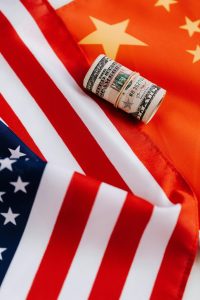Taiwan says war with China absolutely not an option, but will bolster its defences

Armed confrontation between China and Taiwan is absolutely not an option for our two sides – but equally absolute is that theislands freedom and democracy must be maintained, Taiwanese President Tsai Ing-wen said on Monday.
Provided there is rationality, equality and mutual respect, we are willing to work with the Beijing authorities to find a mutually agreeable arrangement for upholding peace and stability in the Taiwan Strait, she said at the islands 111th national day celebrations.
This is our shared responsibility, she added.
Ms Tsais address, delivered outside the presidential office in Taipei, comes as cross-strait tensions run at their highest in decades.
It is regrettable that Beijing in recent years has escalated its intimidation and threatened peace and stability in the Taiwan Strait and the region, she said.
But the broad consensus in Taiwan is that its national sovereignty and its free and democratic way of life must be defended, she added.
On this point, we have no room for compromise.
Her speech comes just days ahead of the Communist Party of Chinas congress that starts on Oct 16, when Chinese President Xi Jinping is expected to assume an unprecedented third term in office.
When that happens, Taiwanese officials have said they anticipate Beijing to increase its coercion and intimidation towards the island, which China eventually intends to reunify with the mainland.
Beijing views any actions that suggest Taiwans sovereignty as unacceptable.
It demonstrated its displeasure over United States House Speaker Nancy Pelosis visit to Taipei in early August with a series of unprecedented military drills around Taiwan – including flying ballistic missiles over the island.
Chinese warships and warplanes have continued to cross the median line dividing the Taiwan Strait almost daily as Beijing underscores that it does not recognise the territorial demarcation.
On Monday, Ms Tsai promised to bolster Taiwans defences, which includes acquiring more mobile precision weapons that will help Taiwans asymmetric warfare capabilities.
Asymmetric warfare refers to a smaller force using unconventional tactics against a larger enemy.
Taiwan has proposed a record NT$586.3 billion (S$27 billion) in defence spending for next year. More On This Topic Taiwan president Tsai to pledge to bolster combat power as China tensions rise Taiwan signals its chip firms will follow new US rules on China Noting the islands increased defence budget every year, Ms Tsai said: Through our actions, we are sending a message to the international community that Taiwan will take responsibility for our own self-defence, that we will not leave anything to fate.
Her stance comes as the US has been increasingly vocal in its support for the island.
In September, US President Joe Biden said that American forces would defend Taiwan if it is attacked.
Washington has been encouraging Taipei to prioritise its national defence and improve Taiwans self-defence capabilities, as one of the important conditions for Washington to improve its military aid to Taiwan, said Dr Qi Dongtao, a senior research fellow at the National University of Singapores East Asian Institute.
Now, Ms Tsai has responded to Washingtons concern publicly, explicitly and positively, he added. Taiwan has come under increasing military and political pressure from Beijing in recent months. PHOTO: AFP Overall, however, he felt that Ms Tsai did not make provocative statements in her speech and followed her usual low-profile style of resisting Beijings pressures.
Still, Mr Sung Wen-ti, a lecturer at Australian National Universitys Taiwan Studies Programme, said that while Ms Tsai has expressed an openness to talks with China, it is not on Beijings terms.
She clearly listed her non-negotiables, he added.
On Monday afternoon, Chinas Foreign Ministry said that the root cause of the problems in the Taiwan Strait is the Taiwanese governmentseeking independence. More On This Topic Turbulence in the Taiwan Strait: Tensions between the US, China and Taiwan escalate Fear of conflict – the key to managing Taiwan tensions



